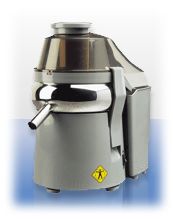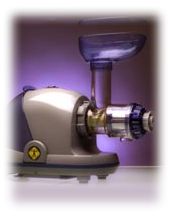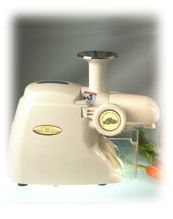 Extracting the fresh, raw juice from fruit and vegetables is one of the best possible ways of obtaining the nourishment they provide. With a good juice extractor you can get your recommended five portions a day in a single glass, so there is no easier way to increase the quantity of fresh produce in your diet.
Extracting the fresh, raw juice from fruit and vegetables is one of the best possible ways of obtaining the nourishment they provide. With a good juice extractor you can get your recommended five portions a day in a single glass, so there is no easier way to increase the quantity of fresh produce in your diet.
The most important point is that this nourishment is delivered in a raw and vital form. In trying to encourage us to increase our intake of fresh produce, the medical profession advises us not to overcook our vegetables. This is the best advice possible, since the minute we apply heat to food we begin to destroy the vital nutritive components it contains.
Science supports the notion that 'raw is best', but personally I have found no better teacher than experience. My advice to anyone who is considering the pros and cons of juicing is simple: try it and let your body decide! People who adopt this healthy lifestyle choice commonly report similar benefits. These include increased energy levels, reduced need for sleep, increased resistance to common ailments and vibrant health. Some also report weight loss and I have found that my appetite reduces when I am juicing regularly. This may be attributable to the wide range of easily digested, high quality nutrients present in raw juice. If we consume mainly cooked food it seems reasonable that the body continues to crave more food to satisfy the need for the nutrients cooking has destroyed. This can lead to eating more of these depleted foods and an increase in body fat.
There is a more serious aspect to the obvious health benefits of juicing. Many believe that raw juice is a powerful weapon in the fight against ill health and the cancer fighting properties of some foods, broccoli and carrots for example, are the subject of much research. Nutritional therapies often recommend juicing; The Gerson Therapy uses organic juice as part of a regime that claims success with serious illness, including cancer. I have personally witnessed my Nephew, Nick Ledger, reverse the extremely unpleasant symptoms of ulcerative colitis using a juice-based approach to nutrition.
Armed with some of this knowledge, people in search of a juicer are often bewildered by the amount of confusing and apparently contradictory information that is out there. I've been juicing since the early 1980's and I've had the opportunity to test many different juicers since then. Hopefully the information below will help cut through some of the confusion and give you an idea what to look for if you are thinking of buying a juicer.
Choosing a Juicer
The first point to be made here is that no matter what juicer you buy, if it gets juice out of fruit and vegetables, it delivers a nutritious drink and you will benefit. Some manufacturers give the impression you'll die of cancer if you don't buy their juicer and that other brands destroy every bit of goodness in the juice they extract! This is untrue but some do get a more nutritious juice than others. Unfortunately the self-cleaning juicer we are all looking for is yet to be invented!
Quality vs Quantity
It might seem reasonable to assume that the juicer that gets the most juice is the best juicer. If you are concerned about the quality of the juice this is not necessarily so. The quality of the juice relates to how well the plant fibres are broken down in the juicing process and the quantity relates to the force used to separate the pulp from the juice. Also, some juicers allow more pulp into the drink than others, which can give a misleading idea of how much juice they produce by bulking up the volume.
Ease of Use
Extracting a better quality of juice usually means spending a little more time using and cleaning your juicer. Beware of models that don't eject the pulp, as making enough juice for a family can be bothersome as they only produce a small batch before you have to empty them.
Types of Fruit and Vegetable Juicers
There are two main categories of domestic juicer available: centrifugal or masticating.
In the masticating category there are a further three sub-types: single auger/screw type, single cutter and twin gear.
Centrifugal Juicers
These offer an excellent introduction to juicing with the advantage of being quick and easy to use. They extract juice by passing produce over a rapidly spinning grater disc with sharp teeth that release the liquid contents from the plant cells. The juice is spun through a strainer basket. Juice is best drunk immediately because of the air these machines spin into the drink, which causes more rapid oxidation. These juicers don't juice wheatgrass and aren't so good with leafy greens. The L'Equip 110.5 performs well in this category.
Masticating Juicers
These give a better quality and fuller flavoured juice by achieving a more complete breakdown of produce, exerting a chewing and grinding action on the plant fibres.
Single Auger/Screw Type
These use a slow turning screw similar to a mincer to crush and grind produce under pressure and strain the juice through a screen. They are a good choice for those wishing to juice greens and perform additional food processing functions. The L'Equip Visor is an example of this type. Takes about twice as long to use and clean as a centrifugal.
Single Cutter Type
The only real contender in this category is The Champion Juicer. A cylindrical cutter with rows of stainless steel teeth chews and shreds produce inside the juicer and squeezes juice through a screen. Offers unparalleled durability for general fruit and vegetable juicing. Takes about the same time to use and clean as a centrifugal.
Twin Gear Type
Two closely engineered cylindrical gears slowly crush and grind produce and squeeze juice through a screen, delivering the ultimate in juice quality. This does a better job than a screw type for all the same things, including wheatgrass. The Twin Health is the most user-friendly twin-gear I have encountered. Takes about twice as long to use as a centrifugal, but the juice quality is incomparable.
Comparison Test
| |
L'Equip 110.5 (centrifugal) |
Champion Juicer (single cutter masticating) |
L'Equip Visor (single auger/screw masticating) |
The Twin Health (twin gear masticating) |
| |
 |
 |
 |
 |
| |
|
|
Juice quality |

|

(8.5 for greens)
|

|

|
|
Juices wheatgrass? |

|

|
 
|
 
|
| |
|
|
Ease of cleaning |

|

|

|

|
|
Ease of use |

|

|

|

|
|
Durability |

|

|

|

|
| |
|
|
Pulp-free juice? |

|

|

|

|
|
Makes nut butters and purees? |

|
 
|
 
|
 
|
| |
|
|
RRP |
£99 |
£249 |
£199 |
£375 |
|
Value for money |

|

|

|

|